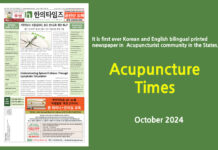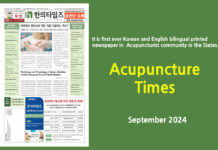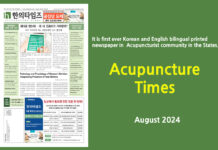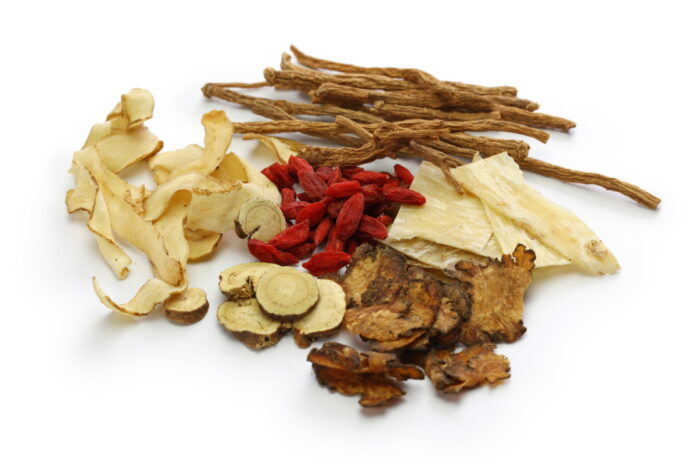Written By Jun Heo(許浚, 1539~1615), Translated by Namil Kim, Wung Seok Cha et al., Published by Ministry of Health & Welfare (Korea)
11 Prognosis of Blood Diseases 血病吉凶 혈병의 예후
- ① If blood counterflows, it is difficult to cure; if blood flows in order, it is easy to cure. If there is no tidal fever, the disease is mild; if there is tidal fever, the disease is grave. If the patient has a tidal fever with a large pulse, the person will die. If the patient bleeds through the nine orifices and has a fever and insomnia, the patient will die. Moreover, in the blood syndrome, if yang is exuberant, the patient has fever and thirst; if yin is exuberant, the body is cold and there is no thirst. Blood is yin, therefore it is easy to cure when the body is cool. If the vessels of the heart and lungs break down and blood comes out through the nose and mouth, it cannot be cured.
- ② In the Divine Pivot (靈樞), it is said, “Sometimes, when the disease is severe, the body becomes thin and has a fever, the complexion is pale and there are bloodclots in the feces. Bloodclots in the feces indicate that the disease is grave, which is an unfavorable sign. If the pulse is large in continuous epistaxis, it is an unfavorable sign. If the patient coughs, has hematuria, and the pulse is small and strong even if his body becomes thin, it is an unfavorable sign. If the patient vomits blood, feels fullness in the chest, has back strain and the pulse is small and rapid, it is an unfavorable sign. If there is distention of the abdomen, hematochezia, and a large pulse, this is an unfavorable sign. and If the patient coughs, has hematuria, and the pulse is strong even if the body becomes thin, it is an unfavorable sign.”
- ③ Dongyuan (東垣) said, “Among many bleeding syndromes, if there is a fever and a large pulse, it is difficult to cure. This is because of excessive pathogenic qi. If the body is cold and the pulse is stable, it is easy to cure. This is because healthy qi has been recovered.”, “Spitting of blood ․ vomiting blood․ hematemesis caused by blood regurgitation in the
upper part of the body are all unfavorable signs. Then if blood flows downward and becomes dysentery, it is good sign. Going upward is counterflowing, thus it is difficult to cure. Going downward is flowing in order, thus it is easy to cure. That is why Zhongjing said, ‘If there is vaginal bleeding during the blood amassment symptoms, it is cured naturally by itself.’ But if a woman without any disease suddenly has vaginal bleeding, it indicates that the disease is progressing. Now, blood flows upward, comes back downward and becomes dysentery, thus one can see that it is a good sign because it indicates that pathogenic qi is getting out.” - ④ Zhongjing (仲景) said, “If the patient has hematemesis, coughing with dyspnea, rapid pulse, heat and insomnia, the patient will die.”
- ⑤ Sudden bloody diarrhea without any reason is called ‘heart exhaustion’, which is difficult to cure.
- ⑥ In a greater yang Cold Damage syndrome, if there is epistaxis, the patient is getting better. If there is vaginal bleeding naturally when heat is lumped in the bladder, it indicates that the patient is recovering from disease. From this respect, one can see that if the patient who has heat caused by other diseases wants to vomit due to the stagnant fever of the upper energizer, one is recovering from the disease. However, the bleeding must stop by itself after vomiting blood.[B186]
12 Blood Collapse Syndrome 亡血脫血證망혈증과 탈혈증
- ① In the Divine Pivot (靈樞), it is said, “If the end of the nose is white, there is blood collapse.” “Thoroughfare vessel is the sea of blood. If the sea of blood is insufficient, the complexion is pale and the face does not have color.” and “If the patient sheds too much blood, the face is pale, lackluster and the pulse is vacuous.”
- ② In the Inner Classic (內經), it is said, “If many blue vessels appear on the arm, this is collapse due to the massive hemorrhage.” And “if the pulse is energetic even when the patient is lying comfortably, this is collapse due to the massive hemorrhage.”
- ③ Dongyuan (東垣) said, “When the six pulses are string-like ․ fine ․ rough that feel vacuous when pressed in a patient with a pale complexion lacking luster, this collapse is due to a massive hemorrhage.” A Four Substances Decoction (四物湯) [prescription is mentioned later] and a Heaven, Human, and Earth Pill (三才丸) are widely used.
- Heaven, Human, and Earth Pill 三才丸 삼재환: It tonifies a blood deficiency. Asparagi Tuber (天門冬), Rehmanniae Radix
Preparata (熟地黃) and Ginseng Radix (人蔘) are used in the same amounts. Grind these medicines into powder, knead with honey and make pills as big as a seed of the royal foxglove tree. Take 100 pills anytime with alcohol or thin rice gruel.
13 Epistaxis 衄血 육혈
- ① The nose and the brain are connected. If blood overflows in the brain, it also overflows through the nose. In addition, if the patient has heat accumulated in yang brightness, blood comes out through the nose and mouth. Epistaxis comes out from the lungs, that is why we have to use Chuanxiong Granular Powder, Three Yellows Tonify Blood Decoction, Chicken and Perilla Powder, Tao’s Rehmannia, Scutellaria, and Coptis Decoction, Preserve Life Rehmannia Powder. [Prescription is mentioned in the chapter on ‘Medicines Commonly Used in Blood Diseases’]. Settle Nosebleed Decoction, Relieve Depression Decoction.
- ② Danxi (丹溪) said, “To treat epistaxis, cool and circulate the blood. Add Curcumae Radix (鬱金), Scutellariae Radix (黃芩) (thick one that breaks easily), Cimicifugae Rhizoma (升麻) in Rhinocerotis Cornu and Rehmannia Decoction.”
- ③ Dongyuan (東垣) said, “Epistaxis is from the lungs, that is why we mainly use medicinal like Rhinocertis Cornu (犀角), Cimicifugae Rhizoma (升麻), Gardeniae Fructus (梔子). Scutellariae Radix (黃芩), Paeoniae Radix (芍藥), Rehmanniae Radix
Crudus (生地黃). Asteris Radix (紫菀), Salviae Miltiorrhizae Radix (丹蔘), and Asini Corii Colla (阿膠).” - ④ In the Inner Classic (內經), it is said, “If heat moves to the liver from the spleen, the patient is frightened or has epistaxis. Epistaxis occurs mainly in the spring. Epistaxis occurs when lesser yin arrives. And also, When the yang brightness vessel counterflows, the patient has dyspnea, coughing, a fever, a tendency to get frightened, epistaxis and hematemesis.”
- ⑤ If epistaxis does not stop, prescribe Musk Powder or various medicines in order to hold the patient’s nose. You can also use various kinds of hemostatic methods.
- ⑥ In Cold Damage, the patient should sweat. But if the person does not sweat, and exuberant heat suppresses the blood, the person will definitely experience epistaxis. Use an Ephedra and Cimicifuga Decoction, Ephedrae and Cinnamomum Decoction․ Talcum Pill. If chronic exuding of snivel from the nose becomes epistaxis, use a Rhinocerotis Cornu and Rehmannia Decoction.
• Chuanxiong Granular Powder 莎芎散 사궁산: ① It cures epistaxis. 4 nyang of Cyperi Rhizoma (香附子), 2 nyang of Cnidii Rhizoma (川芎). Grind these medicines into powder, dilute 2 don in green tea and take anytime. ② This is the same prescription as the Chuanxiong and Aconite Drink (芎附飮) in the Danxi’s Essential Methods (丹溪心法). Cyperi Rhizoma (香附子) breaks stagnation, circulates qi, and disperses the pathogenic Fire into the meridians and collaterals. Cnidii Rhizoma (川芎) harmonizes the blood, relieves the liver, and makes the blood come back into the liver. If the blood comes back and the Fire is dispersed, epistaxis stops immediately.
• Three Yellows Tonify Blood Decoction 三黃補血湯 삼황보혈탕: It cures cases when the six pulses are vacuous and hollow and when the patient has epistaxis or hematemesis. 2 don of Cimicifugae Rhizoma (升麻), Paeoniae Radix Alba (白芍藥) each, 1 don of Rehmanniae Radix Preparata (熟地黃), 7.5 pun of Angelica Gigantis Radix (當歸), Cnidii Rhizoma (川芎) each, 5 pun of Rehmanniae Radix Crudus (生地黃), Bupleuri Radix (柴胡), Astragali Radix (黃芪), Moutan Cortex (牧丹皮) each. Mix these drugs to make one package and decoct with water.
• Chicken and Perilla Powder 雞蘇散 계소산: Epistaxis does not stop because of lung-Metal suppressed by ministerial Fire. 1 don of Stachys Folium (鷄蘇葉), Astragali Radix (黃芪), Rehmanniae Radix Crudus (生地黃), Asini Corii Colla (阿膠珠) and Imperatae Rhizoma (白茅根) each. 5 pun of Liriopis Tuber (麥門冬), Platycodonis Radix (桔梗), Typhae Pollen (蒲黃) (stir-baked), Bulbus Fritillariae Cirrhosae (貝母) (stir-baked), Mori Cortex (桑白皮) and Glycyrrhizae Radix (甘草) (baked) each. Mince these drugs to make one package. Boil it with 3 pieces of Zingiberis Rhizoma Crudus (生薑). You can also infuse Minium into the nose.
• Tao’s Rehmannia, Scutellaria, and Coptis Decoction 陶氏生地芩連湯 도씨생지금련탕: It treats epistaxis that does not stop, excessive loss of blood, delirious speech, loss of vitality, closed eyes, shaking hands in the air, and unconsciousness. 1 don of Rehmanniae Radix Crudus (生地黃), Scutellariae Radix (黃芩), Coptidis Rhizoma (黃連), Gardeniae Fructus (梔子), Cnidii Rhizoma (川芎), Paeoniae Radix (赤芍藥), Bupleuri Radix (柴胡), Platycodonis Radix (桔梗), Rhinocertis Cornu (犀角) (grind out in powder) and Glycyrrhizae Radix (甘草) each. Mince these drugs to make 1 package and boil down with 1 Zizyphi Fructus (大棗). Add the juice of Nelumbinis Rhizoma (蓮根) or ink to the decoction.
• Settle Nosebleed Decoction 淸衄湯 청뉵탕: It treats epistaxis. 1 don of Angelica Gigantis Radix (當歸), Paeoniae Radix (赤芍藥), Rehmanniae Radix Crudus (生地黃), Cyperi Rhizoma (香附子), Scutellariae Radix (黃芩), Gardeniae Fructus (梔子) and Thujae Orientalis Folium (側柏葉) each, 7 pun of Coptidis Rhizoma (黃連), 5 pun of Poria Sclerotium Rubra (赤茯苓) and
Platycodonis Radix (桔梗), 3 pun of Glycyrrhizae Radix (甘草) (crude one), and 5 Nelumbinis Rhizomatis Nodus (藕節). Mince these drugs to make 1 package, decoct with water, and add a child’s urine before taking.
• Relieve Depression Decoction 解鬱湯 해울탕: It treats epistaxis. 1 don of Bupleuri Radix (柴胡), Coptidis Rhizoma (黃連), Scutellariae Radix (黃芩), Astragali Radix (黃芪), Lycii Radicis Cortex (地骨皮), Rehmanniae Radix Crudus (生地黃), Rehmanniae Radix Preparata (熟地黃), and Paeoniae Radix Alba (白芍藥) each. Mince these drugs and decoct in water.
• Rhinocerotis Cornu and Rehmannia Decoction 犀角地黃湯 서각지황탕: ① It treats epistaxis and hematemesis that do not stop. It also treats a yellow complexion and black feces due to static blood in the upper energizer. It breaks static blood. 3 don of Rehmanniae Radix Crudus (生地黃), 2 don of Paeoniae Radix (赤芍藥), and 1 don of Rhinocertis Cornu (犀角) (ground into powder) and Moutan Cortex (牧丹皮) each. Mince these drugs to make one package and decoct with water.[B146] ② In the Recovery from the Myriad Diseases (回春) it is said to add 1 don of Angelica Gigantis Radix (當歸),
Scutellariae Radix (黃芩), and Coptidis Rhizoma (黃連) each, and the effect is better.
• Ephedra and Cimicifuga Decoction 麻黃升麻湯 마황승마탕: It treats epistaxis caused by heat depression due to unreleased exterior symptoms in Cold Damage. It is called red sweat among people. 1 don of Ephedrae Herba (麻黃), Cimicifugae Rhizoma (升麻), Paeoniae Radix (赤芍藥), Scutellariae Radix (黃芩), Gypsum Fibrosum (石膏), Poria Sclerotium Rubra (赤茯苓) and Glycyrrhizae Radix (甘草) each. Mince these drugs to make one package and boil down with 3 pieces of Zingiberis Rhizoma Crudus (生薑) and water. Take it hot and induce a little perspiration.
• Ephedrae and Cinnamomum Decoction 麻黃桂枝湯 마황계지탕: It treats epistaxis due to no perspiration in Cold Damage. It also cures epistaxis or hematemesis caused by the cold. 1 don of Ephedrae Herba (麻黃), Paeoniae Radix Alba (白芍藥), Astragali Radix (黃芪) and Glycyrrhizae Radix (甘草) (baked) each, 3 pun of Liriopis Tuber (麥門冬) and Ginseng Radix (人蔘), and 5 grains of Schisandrae Fructus (五味子). Mince these drugs to make 1 package and boil down with water.
• Musk Powder 麝香散 사향산: ① It treats epistaxis that does not stop. 3 don of Alumen (白礬) (baked) and white Fossilia Ossis Mastodii (龍骨) each, and 1.5 pun of Moschus (麝香). Grind these medicines into fine powder. Use a little quantity. First, wash the inside of the nose with cold water, then infuse the powder into the nose. Put some powder on wet paper and blow through the nose. There will be a marvelous effect. ② Grind Fulvis Fumi Carbonisatus into fine powder, add 2 don of this powder to water and take it. This is called Dark Spirit Powder. You can also infuse this powder into the nose. ③ If the epistaxis does not stop, infuse into the nose the powder of Typhae Pollen (蒲黃) (stir-baked), powder of Draconis Sanguis (血竭), powder of Carbonisatus Crinis (油髮) (ashes), or the powder of Praecipitatum Urinarium Hominis (人中白).
• Talcum Pill 滑石丸 활석환: It treats epistaxis due to no perspiration in Cold Damage. If there is bleeding, use this medicine quickly in order to stop it. Knead the powder of Talcum (滑石) with steamed rice and make pills as big as the seed of the royal foxglove tree. Chew and crush 10 pills and swallow them with just drawn water, and the bleeding will soon stop.






































